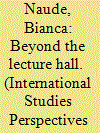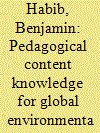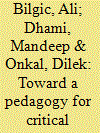|
|
|
Sort Order |
|
|
|
Items / Page
|
|
|
|
|
|
|
| Srl | Item |
| 1 |
ID:
160969


|
|
|
|
|
| Summary/Abstract |
As the global population is lifted out of poverty through intergovernmental and national efforts, the number of students enrolled in university degree programs has been steadily increasing. Although this is generally a good indicator for human development, it has resulted in oversaturated job markets where competition for employment is fierce and only the most capable university graduates are employed. Students from rural universities in the Global South face particular difficulties in this competition. This article draws on literature from educational psychology to propose practical teaching methods that simultaneously equip students with marketable, job specific skills, and foster within them feelings of empowerment. These prepared and empowered students are the cornerstones of sustainable development in rural communities.
|
|
|
|
|
|
|
|
|
|
|
|
|
|
|
|
| 2 |
ID:
160964


|
|
|
|
|
| Summary/Abstract |
Pedagogical design in international relations and environmental politics needs to help students become active participants in the sustainability transition. This article documents the use of a blog-based assessment activity in an international relations undergraduate course Global Environmental Politics. The activity has a multifunctional design that draws on different forms of pedagogical content knowledge to enhance student learning. These include metacognitive skill development in relation to environmental politics, cultivation of professional networks in the environment and sustainability field, and methods of active participation in the politics of the sustainability transition. Blog-based representations of pedagogical content knowledge can be replicated across international relations curricula.
|
|
|
|
|
|
|
|
|
|
|
|
|
|
|
|
| 3 |
ID:
160972


|
|
|
|
|
| Summary/Abstract |
Although Pakistan's higher education sector has seen seismic reforms since 9/11, little is known about the impact of those reforms on day-to-day instruction at Pakistani universities. Based on fieldwork at three institutions, this article examines the impact of these reforms on the teaching of international relations. This study makes several points. First, faculty who receive advanced degrees abroad and return to Pakistan have introduced a culture of innovation at Pakistani universities, but the changes have been too abrupt. Second, students express clear preference for their instruction to be in English. Third, students have limited appetites for instruction in their first language. Fourth, the staff and students at one of the military institutions examined displayed a moderate, often liberal view. Finally, universities still lag behind in catering to the learning needs of a diverse student body.
|
|
|
|
|
|
|
|
|
|
|
|
|
|
|
|
| 4 |
ID:
160971


|
|
|
|
|
| Summary/Abstract |
International relations has increasingly paid attention to critical pedagogy. Feminist, postcolonial, and poststructuralist international relations scholarship, in particular, have long been advancing discussions about how to create a pluralist and democratic classroom where “the others” of politics can be heard by the students, who then can critically reflect upon complex power relations in global politics. Despite its normative position, critical security studies has so far refrained from joining this pedagogical conversation. International relations scholars in critical security studies can contribute to the production of a critical political subject in the “uncomfortable classroom,” one who reflects on violent practices of security. Three pedagogical methods will be discussed here: engaging with the students’ lifeworlds, revealing the positionality of security knowledge claims, and opening up the classroom to the choices about how student agency can be performed beyond the classroom. The argument is illustrated with reference to international relations and politics students’ perceptions of Syrian refugees in Turkey. The article advances the discussion in critical international relations pedagogy and encourages critical security studies scholarship to focus on teaching in accordance with its normative position.
|
|
|
|
|
|
|
|
|
|
|
|
|
|
|
|
| 5 |
ID:
160959


|
|
|
|
|
| Summary/Abstract |
How do we teach and learn the human experience of war? How far removed is this experience from a classroom? This article uses these questions as the starting point for an investigation into the presence/absence of war experience, the effects of narratives distancing war, and the consequences of challenging these narratives. It draws on the experience of an undergraduate module at the University of Kent that investigates the human experience of war in which students were asked to reflect on the question of distance between those living “war experiences” and their lives in a small British city. Unexpectedly in 2015, several students argued that this distance was the lecturer's construction. By making war personal—without any of them having experienced a “war zone”—the students chose to argue that war was also their experience. This response directly challenges an established narrative in international relations that the West has been essentially at peace since World War II, a narrative that obscures the fundamental role of war experience in the lives of ordinary citizens. It leads to a broadened understanding of war experience that has important conceptual, political, and normative implications in the study of war and on our political responsibility in the everyday.
|
|
|
|
|
|
|
|
|
|
|
|
|
|
|
|
|
|
|
|
|